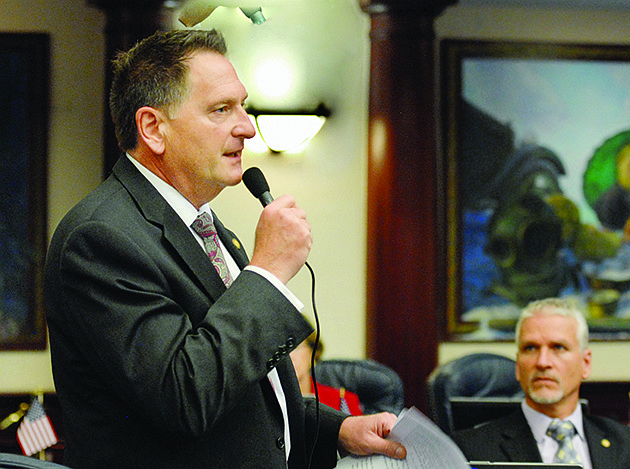The two-month annual slosh through the wants and needs of Florida's residents and businesses begin this month in Tallahassee.
Nearly 1,500 bills already have been filed through the end of February for the 2015 legislative session, with a few hundred more expected before the session ends.
Like tadpoles swimming to safety, less than 20% will actually pass both the House and Senate, and earn approval from Gov. Rick Scott. But lawmakers are not discouraged, looking to tackle hot topics such as microbreweries, film incentives, government contracts and even national debates like minimum wage.
Here are some of the business-related bills filed that will be considered by the Legislature in the coming months:
H.B. 245
Tax on Commercial Real Property
 Sponsor: Rep. Larry Ahern, R-Seminole
Sponsor: Rep. Larry Ahern, R-Seminole
Details: Ahern's bill would slowly phase out rental and license fee taxes in the state, completely eliminating such taxes by 2025.
The process begins with an exemption in 2016 for the first $10,000 in fees, increasing to an exemption of $20,000 in 2017. That exemption level would continue to increase by $10,000 each year until it equals a $90,000 exemption in 2024.
Rental and license fees currently carry a 6% tax, except for companies leasing from Florida's turnpike system. The repeal would give companies charging rental and license fees the same exemptions those operating along the Florida Turnpike system already receive.
Status: Referred to committee. State Sen. Alan Hays, R-Umatilla, has filed an identical companion bill in the Senate.
Pass/Fail Meter:

S.B. 214
Discrimination in Employment Screening
 Sponsor: Sen. Jeff Clemens, D-Lake Worth
Sponsor: Sen. Jeff Clemens, D-Lake Worth
Details: Anyone who has ever filled out a job application before knows the kind of questions employers tend to ask like past job history, education and references.
However, if S.B. 214 becomes law, employers won't be allowed to ask applicants in a primary application if they have ever been convicted of a felony. Instead, each applicant would have to be considered for his or her qualifications first, and once the applicant moves forward, only then could an employer ask about past convictions.
The goal, according to the bill, is to remove barriers for those who have served their time, and now want to re-enter the work force.
Status: Referred to committee. State Rep. Bobby Powell, D-Riviera Beach, has filed an identical companion bill in the House.
Pass/Fail Meter:

H.B. 317
Job Creation Through Business Tax Reform
 Sponsor: Rep. Fred Costello, R-Ormond Beach
Sponsor: Rep. Fred Costello, R-Ormond Beach
Details: This ambitious bill would rewrite a lot of the taxes currently imposed on businesses, replacing those revenues with a 1% increase in the state sales and use tax.
It would eliminate corporate income tax, which generates $1.9 billion annually, as well as the sales tax on commercial leases, which brings in another $1.4 billion each year. It also would remove taxes on industrial machinery, which totals $133 million.
A 1% sales tax increase would generate just less than $4 billion a year, with the money saved by businesses acting as a stimulus to grow and expand, and possibly even attract more companies to the state, Costello says.
Status: Referred to committee.
Pass/Fail Meter:

C.S./H.B. 113
Local Government Construction Preferences
 Sponsor: Rep. Keith Perry, R-Gainesville
Sponsor: Rep. Keith Perry, R-Gainesville
Details: Many local ordinances, trying to keep money local, require companies bidding for contracts to meet certain requirements. This bill would limit what local ordinances can demand for any government-funded construction project.
If passed, the bill would no longer allow local governments to give preferential treatment to bidders that maintain an office within that local area, hire employees or subcontractors from that area, or have paid local taxes and assessments in the area.
The goal of the bill, according to a House staff analysis, is to open the bidding process to a larger pool of bidders, including those who might not necessarily have a local presence otherwise.
The bill, however, would not change state requirements of hiring workers within Florida.
Status: Amended on Feb. 5. Now in a subcommittee. State Sen. Alan Hays, R-Umatilla, has filed a similar bill in the Senate.
Pass/Fail Meter:

H.B. 47
State Minimum Wage
 Sponsor: Rep. Cynthia Stafford, D-Miami
Sponsor: Rep. Cynthia Stafford, D-Miami
Details: The battle in Washington between Democrats and Republicans over minimum wage finds its way to Tallahassee in this bill, which proposes raising the state minimum wage from $8.05 to $10.10 an hour.
The straightforward effort is just two pages long, and if it were passed and signed into law, would go into effect at the beginning of 2016.
Lawmakers have found themselves on either side of this debate, primarily along party lines. And with Republicans controlling both the legislative and executive branches in Florida, the bill is more a symbolic gesture than one with any hope of getting passed.
Status: Referred to committee. State Sen. Dwight Bullard, D-Cutler Bay, has filed an identical companion bill in the Senate.
Pass/Fail Meter:


H.B. 253
Small Business Participation in State Contracting
 Sponsor: Rep. Hazel Rogers, D-Lauderdale Lakes
Sponsor: Rep. Hazel Rogers, D-Lauderdale Lakes
Details: Government-funded projects are primarily awarded through bundled contracts, where separate services and contracts usually required for a single project are awarded in one large piece for a private company to administrate.
That normally precludes smaller businesses — firms with fewer than 50 employees -- from getting the chance to participate, since those businesses cannot typically manage such large projects, Rogers claims in her bill. Instead, Rogers wants governments at both the state and local levels to first study whether it needs to bundle the contracts. If so, then officials would have to include all that study information in any request for qualifications.
To further ensure smaller firms have a chance to pick up government contracts, the bill also would require that 35% of the total project cost is earmarked for small businesses. That can take place either by awarding the primary contract to a small business, or ensuring that small businesses are used heavily as subcontractors.
Status: Referred to committee. State Sen. Dwight Bullard, D-Cutler Bay, has filed a similar bill in the Senate.
Pass/Fail Meter:

C.S./H.B. 107
Alcoholic Beverages
 Sponsor: Rep. Greg Steube, R-Sarasota
Sponsor: Rep. Greg Steube, R-Sarasota
Details: It's had all the attention: microbreweries will get expanded protections in Steube's bill, including the ability to sell alcoholic beverages in sizes not previously allowed.
But one aspect of this legislation not getting a lot of attention is one that could eliminate the need for grocery stores to sell harder liquor items in separate storefronts.
Right now, chains like Publix and Winn-Dixie offer spirits like vodka and rum in separate liquor stores, typically right next to the main grocery store. However, lobbyists for larger retailers, like Wal-Mart, have looked to repeal that part of Florida statute, instead allowing those stores to sell all its alcohol in one place.
In its current form, the bill also will allow the sale of what are known as “growlers,” that are containers in sizes of 32, 64 and 128 ounces designed for malt beverages. Growlers are currently prohibited above 32 ounces.
The containers have become popular, especially with microbreweries, as customers looking to drink a little more than a standard can or bottle can have a reusable container.
Status: Amended on Feb. 25. Now in a subcommittee.
Pass/Fail Meter:


S.B. 1046
Entertainment Industry
 Sponsor: Sen. Nancy Detert, R-Venice
Sponsor: Sen. Nancy Detert, R-Venice
Details: Florida continues its struggle to compete against other states like Louisiana and North Carolina when it comes to attracting film productions like “Dolphin Tale 2” and even “Magic Mike.”
Detert has her own plan, which she first offered unsuccessfully last year, that would essentially turn the existing tax credit program into a tax rebate program.
With this bill, Detert breaks up qualifying periods so that all the available funding from the state to attract a film production to Florida is not exhausted immediately. It also creates a “quick action” account for high-profile projects the state might compete for outside of the normal qualifying times.
Detert also wants to create a stronger state film commissioner, who would work inside Enterprise Florida.
Productions would still typically need to have at least $625,000 in qualified expenditures to receive tax credits of 20% of those expenditures, up to $8 million.
Status: Referred to committee.
Pass/Fail Meter:




 Sponsor: Rep. Larry Ahern, R-Seminole
Sponsor: Rep. Larry Ahern, R-Seminole
 Sponsor: Sen. Jeff Clemens, D-Lake Worth
Sponsor: Sen. Jeff Clemens, D-Lake Worth Sponsor: Rep. Fred Costello, R-Ormond Beach
Sponsor: Rep. Fred Costello, R-Ormond Beach
 Sponsor: Rep. Keith Perry, R-Gainesville
Sponsor: Rep. Keith Perry, R-Gainesville
 Sponsor: Rep. Cynthia Stafford, D-Miami
Sponsor: Rep. Cynthia Stafford, D-Miami

 Sponsor: Rep. Hazel Rogers, D-Lauderdale Lakes
Sponsor: Rep. Hazel Rogers, D-Lauderdale Lakes Sponsor: Rep. Greg Steube, R-Sarasota
Sponsor: Rep. Greg Steube, R-Sarasota
 Sponsor: Sen. Nancy Detert, R-Venice
Sponsor: Sen. Nancy Detert, R-Venice




